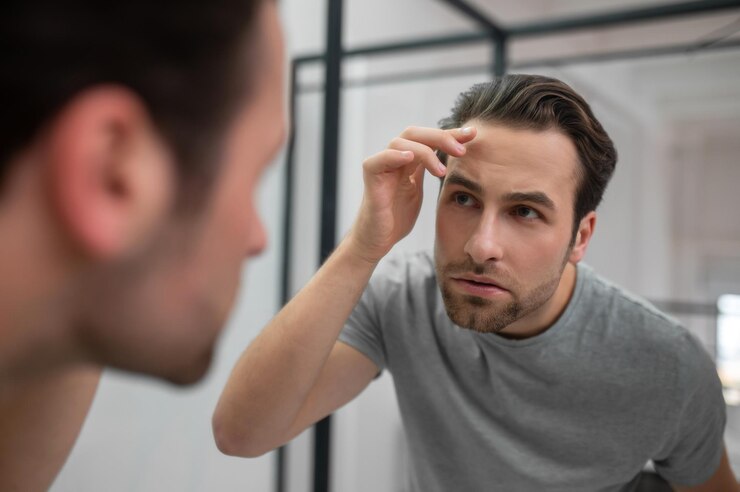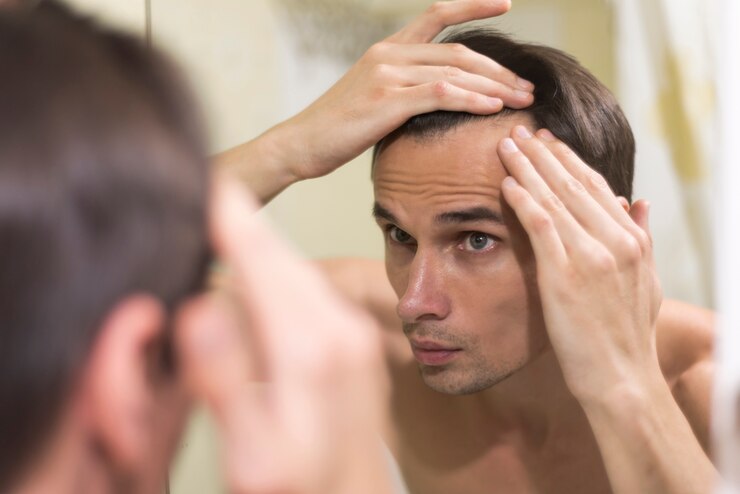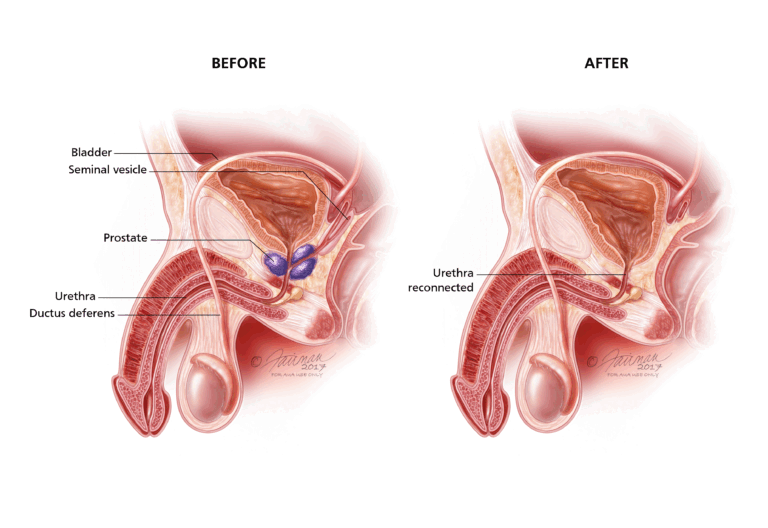The Hair Loss Mystery: How Testosterone Plays a Role and What You Can Do About It

Understanding the Link Between Testosterone and Hair Loss

Testosterone is a hormone that plays a crucial role in the development and maintenance of male characteristics. It is well known for its influence on muscle growth, libido, and bone density. However, it is also linked to hair loss in men. Understanding the connection between testosterone and hair loss can provide valuable insights into the mechanisms behind this common condition.
Hair loss, also known as androgenetic alopecia, is influenced by a complex interplay of genetic, hormonal, and environmental factors. While there are various factors that contribute to hair loss, testosterone and its derivative, dihydrotestosterone (DHT), are believed to play a significant role. DHT is a more potent form of testosterone and is produced when an enzyme called 5-alpha reductase converts testosterone into DHT in certain tissues, including the hair follicles. This conversion can lead to a process known as miniaturization, where the hair follicles shrink and produce thinner and shorter hairs. Over time, the miniaturized hair follicles may stop producing new hairs altogether, resulting in baldness.
Despite the well-established link between testosterone and hair loss, it’s important to note that not all men with high levels of testosterone will experience hair loss. This indicates that other factors, such as genetic predisposition and the sensitivity of hair follicles to DHT, also play a role. Additionally, testosterone is not the sole culprit behind hair loss, as other hormones, nutritional deficiencies, and lifestyle factors can contribute to this condition. Understanding the intricate relationship between testosterone and hair loss can help individuals navigate the available treatment options and make informed decisions to address this common concern.
• Testosterone is a hormone that influences male characteristics such as muscle growth, libido, and bone density.
• Hair loss, or androgenetic alopecia, is influenced by genetic, hormonal, and environmental factors.
• Testosterone can be converted into dihydrotestosterone (DHT) in certain tissues including hair follicles.
• DHT can cause miniaturization of hair follicles, leading to thinner and shorter hairs.
• Over time, miniaturized hair follicles may stop producing new hairs altogether, resulting in baldness.
• Not all men with high testosterone levels will experience hair loss due to other factors like genetics and sensitivity to DHT.
• Other hormones, nutritional deficiencies, and lifestyle factors can also contribute to hair loss.
• Understanding the relationship between testosterone and hair loss can help individuals make informed decisions about treatment options.
Common Misconceptions About Hair Loss and Testosterone

There are several misconceptions surrounding the relationship between hair loss and testosterone. One common misconception is that high testosterone levels always lead to hair loss. While it is true that testosterone plays a role in hair loss, it is not the sole factor. Hair loss is a complex issue influenced by various genetic, hormonal, and environmental factors. Elevated levels of a hormone called dihydrotestosterone (DHT), which is derived from testosterone, can contribute to hair loss in individuals who are genetically predisposed.
Another misconception is that low testosterone levels cause hair loss. While low testosterone levels can lead to certain health issues, they are not directly responsible for hair loss. In fact, some studies have shown that low testosterone levels may actually reduce the risk of male pattern baldness. It is important to note that the relationship between testosterone and hair loss is intricate and multifaceted, and it is essential to understand the underlying mechanisms before making any assumptions.
The Hair Growth Cycle: An Overview
The hair growth cycle is a complex and continuous process that occurs in three stages: anagen, catagen, and telogen. During the anagen phase, which lasts for several years, the hair follicles in your scalp actively produce new hair cells. This is when your hair grows the most. The length of the anagen phase varies between individuals, resulting in different hair lengths.
After the anagen phase, the hair follicles transition into the catagen phase, which is a short transitional period lasting a few weeks. During this phase, the hair follicles shrink and detach from the blood supply, ceasing the production of new hair cells. Following the catagen phase, the hair follicles enter the telogen phase, also known as the resting phase. This phase lasts for several months, during which the old hair remains attached to the scalp while new hair begins to grow underneath.
It is important to understand the hair growth cycle because disruptions or imbalances within these stages can lead to hair loss. Various factors, including hormonal changes, genetics, and certain medical conditions, can influence the duration and progression of each phase. By gaining insight into the intricacies of the hair growth cycle, we can better comprehend the underlying causes of hair loss and explore effective management strategies.
The Effects of Testosterone on Hair Follicles
Testosterone, a hormone predominantly found in males but also present in females in smaller amounts, plays a crucial role in the development and function of hair follicles. The effects of testosterone on hair follicles are complex and multifaceted. On one hand, testosterone is necessary for the growth and maintenance of hair. It stimulates the production of keratin, the protein building block of hair, and supports the health of hair follicles. However, high levels of testosterone can also contribute to hair loss or thinning.
The conversion of testosterone into dihydrotestosterone (DHT) is a key factor in the effects of testosterone on hair follicles. DHT, a potent form of testosterone, binds to receptors in hair follicles and can cause them to miniaturize. This miniaturization process disrupts the normal hair growth cycle and leads to the production of shorter, thinner, and less pigmented hair. With each hair growth cycle, the affected follicles produce progressively thinner hair strands, eventually leading to hair loss if left unchecked.
Here’s a summary of the effects of testosterone on hair follicles:
| Aspect | Effects of Testosterone on Hair Follicles | Source of Information |
|---|---|---|
| Androgenetic Alopecia (Male Pattern Baldness) | Testosterone, when converted to dihydrotestosterone (DHT) by the enzyme 5-alpha-reductase, can contribute to the miniaturization of hair follicles in genetically susceptible individuals. | Journal of the American Academy of Dermatology. 2004 Dec;51(6):897-906 |
| Terminal Hair to Vellus Hair Transformation | Increased levels of DHT can lead to the transformation of terminal hair (thick, pigmented) into vellus hair (fine, unpigmented) in certain areas, especially in the scalp. | Endocrine Reviews. 2002 Jun;23(3):371-95 |
| Hair Growth Stimulation in Other Areas | Testosterone promotes the growth of terminal hair in areas such as the face, chest, and limbs, as seen during puberty. | Endocrine Reviews. 2002 Jun;23(3):371-95 |
| Hair Growth Phases | Testosterone influences the different phases of hair growth, including anagen (growth), catagen (transition), and telogen (rest). | Journal of Investigative Dermatology Symposium Proceedings. 2005 Dec;10(3):209-11 |
It’s important to note that the relationship between testosterone and hair growth is complex, and individual responses can vary. Additionally, other factors, such as genetics and the influence of hormones like estrogen, also play a role in hair health. Always consult with a healthcare professional or dermatologist for personalized advice.
Factors That Contribute to Hair Loss in Men
Hair loss in men can be influenced by a variety of factors. One key factor is genetics. Research has shown that a family history of hair loss can significantly increase the likelihood of experiencing hair loss in men. In fact, a study published in the Journal of Clinical Investigation found that genetic factors account for up to 80% of male pattern baldness cases.
Another important factor that contributes to hair loss in men is hormonal imbalances. Testosterone, the primary male sex hormone, plays a crucial role in hair growth. However, an excess of testosterone can lead to the conversion of the hormone into dihydrotestosterone (DHT), which can negatively impact hair follicles and result in hair thinning and eventual hair loss. Therefore, hormonal imbalances, specifically an increase in DHT levels, can contribute to hair loss in men.
In addition to genetics and hormonal imbalances, other factors such as age, stress, poor nutrition, and certain medical conditions can also play a role in hair loss. Aging is a natural process that affects the hair growth cycle, leading to a decrease in hair density over time. Stress, especially chronic stress, can disrupt the hair growth cycle and contribute to hair loss. Nutritional deficiencies, particularly in essential vitamins and minerals like iron and vitamin D, can weaken hair follicles and promote hair loss. Furthermore, certain medical conditions like thyroid disorders and autoimmune diseases can also cause hair loss in men.
Understanding the various factors that contribute to hair loss in men is essential for effectively managing and addressing the issue. By addressing these underlying factors, individuals can take steps to promote hair growth and prevent further hair loss.
Hormonal Imbalances and Hair Loss: Exploring the Connection
There is a clear connection between hormonal imbalances and hair loss in both men and women. Hormones play a crucial role in regulating various bodily functions, including hair growth. When there is an imbalance in hormone levels, it can disrupt the normal hair growth cycle and lead to hair loss.
One of the hormones that can contribute to hair loss is dihydrotestosterone (DHT). DHT is a derivative of testosterone, a hormone that is typically associated with male characteristics. DHT binds to hair follicles, causing them to shrink and eventually leading to the miniaturization of hair. This process is commonly seen in conditions like male pattern baldness, where the hair at the top of the scalp gradually thins out over time.
In addition to DHT, other hormones such as estrogen and progesterone can also influence hair growth. Changes in these hormone levels, particularly during pregnancy or menopause, can lead to temporary hair loss. Hormonal imbalances caused by conditions like polycystic ovary syndrome (PCOS) can also result in hair thinning or excessive hair growth in certain areas.
Understanding the connection between hormonal imbalances and hair loss is crucial for effective management and treatment. By addressing the underlying hormonal issues, it may be possible to slow down or even reverse hair loss. Various medical treatments, lifestyle changes, and natural remedies can be explored to restore hormone balance and promote healthier hair growth. However, it is essential to consult with a healthcare professional to determine the most suitable approach for each individual’s specific hormonal imbalance and hair loss concerns.
How DHT (Dihydrotestosterone) Affects Hair Loss
Dihydrotestosterone (DHT) is a hormone derived from testosterone through the action of an enzyme called 5-alpha reductase. It is well-established that DHT plays a significant role in the development of hair loss in men. DHT binds to receptors in the hair follicles, particularly those on the scalp, leading to a process called miniaturization. This process gradually reduces the size of hair follicles, resulting in thinner and weaker hair strands. Over time, the affected hair follicles may completely stop producing new hair, leading to baldness.
Research has shown that individuals with higher levels of DHT are more prone to experiencing hair loss. While DHT is important for the development of male characteristics during puberty, its excessive production or sensitivity in certain individuals can have negative effects on hair follicles. Understanding the impact of DHT on hair loss is crucial in developing effective strategies for prevention and treatment. Various medical and natural remedies are available to manage DHT-related hair loss, and these will be further explored in the subsequent sections of this article.
Genetic Predisposition and Testosterone-Related Hair Loss
Hair loss is a common concern for many men, and it is often attributed to genetic predisposition. Research has shown that there is a strong link between genetics and testosterone-related hair loss. It is believed that individuals who have a family history of hair loss are more likely to experience it themselves. This genetic predisposition can influence how sensitive hair follicles are to the hormone dihydrotestosterone (DHT), which plays a significant role in hair loss.
The inheritance pattern for testosterone-related hair loss is complex and can involve multiple genes. There are various studies that support the idea of genetic influence on male pattern baldness, with researchers identifying specific genetic variants that are associated with an increased risk of hair loss. However, it’s important to note that genetics are not the sole determinant of hair loss, and other factors such as hormonal imbalances, nutritional deficiencies, and environmental factors can also contribute to hair loss in men. Understanding the genetic predisposition is one piece of the puzzle when it comes to testosterone-related hair loss, and further research is needed to fully comprehend the intricacies of this relationship.
Other Factors That Can Influence Hair Loss
There are several other factors that can contribute to hair loss, apart from hormonal imbalances and genetics. One such factor is stress. When the body is under high levels of stress, it can trigger a condition known as telogen effluvium, which leads to excessive shedding of hair. Additionally, stress can disrupt the normal hair growth cycle and cause hair to enter the resting phase prematurely. This can result in temporary hair loss.
Another factor that can influence hair loss is poor nutrition. A diet lacking in essential nutrients such as vitamins, minerals, and proteins can lead to weak and brittle hair. Additionally, deficiencies in certain vitamins like vitamin D, vitamin B12, and biotin have been linked to hair loss. Therefore, it is important to maintain a well-balanced diet to support healthy hair growth.
Furthermore, certain medical conditions and medications can also contribute to hair loss. Conditions such as thyroid disorders, scalp infections, and autoimmune diseases can disrupt the hair growth cycle. In addition, certain medications for conditions like cancer, arthritis, and high blood pressure have been known to cause hair loss as a side effect. It is important to consult with a healthcare professional to determine if any underlying medical conditions or medications may be contributing to hair loss.
In conclusion, while hormonal imbalances and genetics are important factors in hair loss, it is crucial to consider other potential influences such as stress, poor nutrition, and underlying medical conditions. By addressing these factors and seeking appropriate medical advice, individuals may be able to better manage and potentially minimize hair loss.
Managing Testosterone-Related Hair Loss: Lifestyle Changes
One of the lifestyle changes that can be beneficial for managing testosterone-related hair loss is maintaining a healthy diet. Adequate nutrition is essential for promoting hair growth and preventing hair loss. Foods rich in vitamins A, C, and E, as well as zinc, iron, and omega-3 fatty acids, can support hair follicle health and stimulate hair growth. Incorporating these nutrients into your diet through sources such as leafy green vegetables, fruits, lean proteins, and nuts can help nourish your hair follicles and promote healthy hair growth.
In addition to a nutritious diet, managing stress levels can also have a positive impact on testosterone-related hair loss. Chronic stress can disrupt hormone balance, including testosterone, leading to hair loss or thinning. Engaging in stress-reducing activities such as yoga, meditation, or regular exercise can help regulate hormone levels and promote overall well-being. Additionally, getting enough sleep is crucial for maintaining hormonal balance, as inadequate sleep can also contribute to hair loss. Prioritizing these lifestyle changes can be a proactive step in managing testosterone-related hair loss.
Medical Treatments for Hair Loss Caused by Testosterone
When it comes to managing hair loss caused by testosterone, there are several medical treatments available that can help slow down or even reverse the process. One option is the use of prescription medications such as finasteride and dutasteride, which work by inhibiting the production of the hormone dihydrotestosterone (DHT). DHT is derived from testosterone and is one of the main causes of hair loss in men. By reducing DHT levels, these medications can help to prevent further hair thinning and encourage new hair growth.
Another medical treatment that is commonly used for testosterone-related hair loss is minoxidil. Originally developed as a blood pressure medication, minoxidil was later discovered to have a side effect of promoting hair growth. It is available over-the-counter in the form of a topical solution or foam and is applied directly to the scalp. Minoxidil works by increasing the blood flow to the hair follicles, stimulating them to enter the active growth phase and produce thicker, healthier hair strands.
It is important to note that while these medical treatments can be effective, they may not work for everyone and results can vary. It is always recommended to consult with a healthcare professional before starting any medication or treatment for hair loss. Additionally, it is worth exploring other lifestyle changes and natural remedies that can complement medical treatments and promote overall hair health.
Natural Remedies and Supplements for Hair Loss
Natural remedies and supplements for hair loss have gained popularity as a potential alternative to medical treatments. While there is limited scientific evidence to support their effectiveness, some anecdotal reports suggest that certain natural remedies and supplements may help promote hair growth.
One such natural remedy is saw palmetto extract, which is believed to inhibit the conversion of testosterone into dihydrotestosterone (DHT) – a hormone commonly associated with hair loss. However, more research is needed to fully understand the efficacy of saw palmetto in treating hair loss.
Another natural supplement that has been explored for its potential hair growth benefits is biotin. Biotin is a B-vitamin that plays a crucial role in hair health, as it supports the production of keratin – a protein that makes up the structure of hair. While biotin deficiency can lead to hair loss, there is limited evidence to suggest that supplementation may be beneficial for individuals without a deficiency.
It’s important to note that before starting any natural remedies or supplements for hair loss, it is advisable to consult with a healthcare professional. They can provide personalized advice based on your specific needs and guide you towards the most appropriate treatment options. Additionally, it’s crucial to maintain realistic expectations and understand that individual results may vary.
Conclusion: Empowering Yourself in the Battle Against Hair Loss
Hair loss can be a distressing issue for many individuals, particularly men who may be experiencing hair loss as a result of testosterone-related factors. While it is important to understand the link between testosterone and hair loss, it is equally crucial to explore the various factors that contribute to hair loss and to empower oneself with knowledge and strategies to manage and potentially prevent further hair loss.
One key factor to consider is the role of hormonal imbalances in relation to hair loss. Hormones, including testosterone, play a significant role in the regulation of hair growth and loss. Understanding the connection between hormonal imbalances and hair loss can help individuals make informed decisions about their hair health. Additionally, genetic predisposition and the presence of dihydrotestosterone (DHT), a byproduct of testosterone, can also contribute to hair loss. Being aware of these factors can empower individuals to take proactive steps in managing their hair loss.
What is the link between testosterone and hair loss?
Testosterone can contribute to hair loss in men due to its conversion into a hormone called dihydrotestosterone (DHT), which can shrink hair follicles and lead to hair thinning and eventual loss.
Are there any misconceptions about hair loss and testosterone?
Yes, one common misconception is that high testosterone levels directly cause hair loss. In reality, it is the conversion of testosterone into DHT that is primarily responsible for hair loss.
Can you provide an overview of the hair growth cycle?
The hair growth cycle consists of three phases: anagen (active growth), catagen (transition), and telogen (resting). Understanding this cycle is crucial in understanding the factors that contribute to hair loss.
How does testosterone affect hair follicles?
Testosterone can bind to receptors in hair follicles, leading to the production of DHT. DHT can then bind to these follicles, causing them to shrink over time and produce thinner and shorter hair strands.
What are the factors that contribute to hair loss in men?
Apart from testosterone and DHT, other factors that contribute to hair loss in men include genetic predisposition, hormonal imbalances, age, stress, certain medical conditions, and lifestyle factors.
Is there a connection between hormonal imbalances and hair loss?
Yes, hormonal imbalances, such as an excess of testosterone or an imbalance between testosterone and estrogen, can contribute to hair loss in men.
How does DHT affect hair loss?
DHT can bind to hair follicles and cause them to miniaturize over time. This leads to the production of shorter, thinner, and weaker hair strands, eventually resulting in hair loss.
Can genetic predisposition play a role in testosterone-related hair loss?
Yes, individuals with a genetic predisposition to hair loss may be more susceptible to the effects of testosterone and DHT on hair follicles, leading to earlier and more severe hair loss.
What are some other factors that can influence hair loss?
Other factors that can influence hair loss include poor nutrition, certain medications, smoking, excessive heat or chemical styling, and certain medical conditions like autoimmune disorders.
How can one manage testosterone-related hair loss through lifestyle changes?
Lifestyle changes that can help manage testosterone-related hair loss include maintaining a healthy diet, managing stress levels, avoiding harsh hair treatments, and practicing good hair hygiene.
Are there medical treatments available for hair loss caused by testosterone?
Yes, there are medical treatments such as minoxidil and finasteride that can help slow down hair loss and promote hair regrowth in individuals experiencing testosterone-related hair loss.
Are there any natural remedies or supplements that can help with hair loss?
Some natural remedies and supplements, such as saw palmetto, pumpkin seed oil, and biotin, have been suggested to potentially aid in managing hair loss. However, it’s important to consult a healthcare professional before trying any supplements.
How can one empower themselves in the battle against hair loss?
Empowering oneself in the battle against hair loss involves understanding the causes and factors contributing to hair loss, seeking professional advice, adopting healthy lifestyle habits, exploring medical treatments, and being proactive in finding solutions that work best for individual needs.






